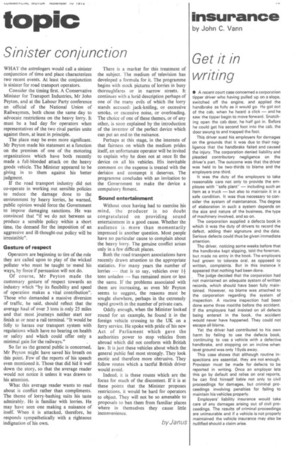Sinister conjunction
Page 71

If you've noticed an error in this article please click here to report it so we can fix it.
WHAT the astrologers would call a sinister conjunction of time and place characterizes two' recent events. At least the conjunction is sinister for road transport operators.
Consider the timing first. A Conservative Minister for Transport Industries, Mr John Peyton, and at the Labour Party conference an official of the National Union of Railwaymen, both chose the same day to advocate restrictions on the heavy lorry. It must be a bad day for operators when representatives of the two rival parties unite against them, at least in principle.
The place may be even more significant. Mr Peyton made his statement at a function on the premises of one of the motoring organizations which have both recently made a full-blooded attack on the heavy goods vehicle. The Minister appeared to be giving in to them against his better judgment.
If the road transport industry did not co-operate in working out sensible policies to reduce the damage done to the environment by heavy lorries, he warned, public opinion would force the Government to impose damaging sanctions. He was convinced that "if we do not between us produce a sensible policy within a short time, the demand for the imposition of an aggressive and ill-thought-out policy will be irresistible".
Gesture of respect Operators are beginning to tire of the role they are called upon to play of the wicked polluter who must be taught to mend his ways, by force if persuasion will not do.
Of course, Mr Peyton made the customary gesture of respect towards an industry which "by its flexibility and speed of operation makes a vital contribution". Those who demanded a massive diversion of traffic. he said, should reflect that the average haul of over 3 tons is only 25 miles and that most journeys neither start nor finish at or near a rail terminal. "It would be folly to harass our transport system with regulations which have no bearing on health or safety and which could offer only a minimal gain for the railways."
So far as the general public is concerned, Mr Peyton might have saved his breath on this point. Few of the reports of his speech even mentioned it. Those that did hid it well down the story, so that the average reader would not notice it unless it was drawn to his attention.
What this average reader wants to read about is conflict rather than compliments. The theme of lorry-bashing suits his taste admirably. He is familiar with lorries. He may have seen one making a nuisance of itself. When it is attacked, therefore, he responds sympathetically with a righteous indignation of his own. There is a market for this treatment of the subject. The medium of television has developed a formula for it. The programme begins with stock pictures of lorries in busy thoroughfares or in narrow streets. It continues with a lurid description perhaps of one of the many evils of which the lorry stands accused: jack-knifing, or excessive smoke, or excessive noise, or overloading. The choice of one of these themes, or of any other, is soon explained by the introduction of the inventor of the perfect device which can put an end to the nuisance.
Perhaps at this stage, in the interests of that fairness on which the medium prides itself, an unfortunate operator will be invited to explain why he does not at once fit the device on all his vehicles. His inevitable comment on the expense is treated with the derision and contempt it deserves. The programme concludes with an invitation to the Government to make the• device a compulsory fitment.
Sound entertainment Without once having had to exercise his mind, the producer is no doubt congratulated on providing sound entertainment in a good cause. Whether the audience is . more than momentarily impressed is another question. Most people have no particular cause to complain about the heavy lorry. The genuine conflict arises only in a few difficult places.
Both the road transport associations have recently drawn attention to the appropriate statistics. For many years the number of lorries that is to say, vehicles over tons unladen has remained more or less the same. If the problems associated with them are increasing, as even Mr Peyton seems to suggest, the reasons must be sought elsewhere, perhaps in the extremely rapid growth in the number of private cars.
Oddly enough, when the Minister looked round for an example, he found it in the foreign vehicle crossing to the UK on a ferry service. He spoke with pride of his new Act of Parliament which gave the authorities power to stop vehicles from abroad which did not conform with British law. It is just these vehicles about which the general public feel most strongly. They look exotic and therefore more obtrusive. They follow routes which a tactful British driver would avoid.
Indeed, it is these routes which are the focus for much of the discontent. If it is at these points that the Minister proposes restrictions, it would be hard for operators to object. They will not be so amenable to proposals to ban them from familiar places where in themselves they cause little inconvenience.
by Janus




































































































































